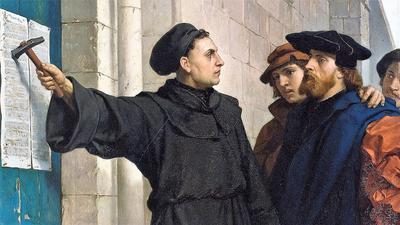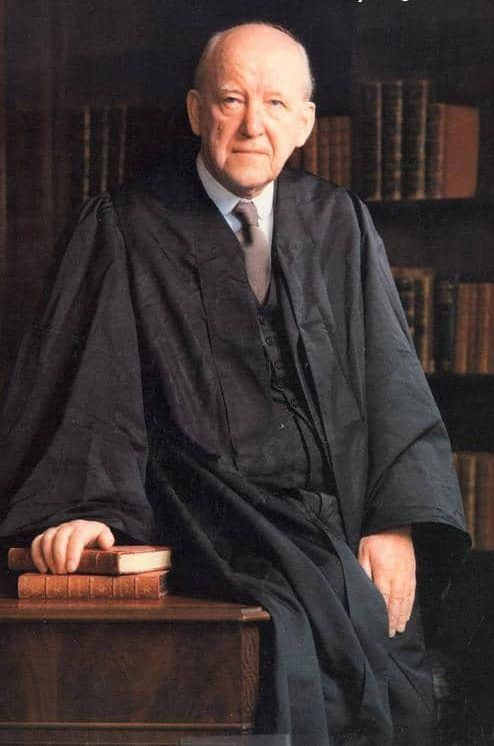
Martin Luther, reflecting on his momentous calling, wrote ‘All I have done is to put forth, preach and write the Word of God, and apart from this I have done nothing’.
In our own days of widespread apostasy, ignorance and superstition, I cannot help but feel that Christians need to look back to the sixteenth-century Reformation for inspiration and guidance.
As a historian I am often appalled by the dearth of knowledge, and almost non-existent understanding, of the Reformation, that glorious revival of true religion. How many people today truly appreciate how the Lord, in his grace and to his wondrous glory, resuscitated a moribund church in Europe and throughout the British Isles?

How often are we confronted today by flippant and grossly ignorant claims that many of our present-day woes (in Scotland and elsewhere) are somehow linked to the ‘censorious, dour and bigoted’ teachings of John Calvin? Similarly, John Knox’s name is almost universally known and derided in his native country. Yet our generation knows next to nothing of the life and works of these great and inspirational figures.
Scripture alone
This article aims to demonstrate that the power and efficacy of our Protestant forebears lay in their Spirit-led conviction that the Holy Bible is the inerrant and inspired Word of God. It, and it alone, is the authority on all matters pertaining to faith and doctrine. Only by grasping this precious truth, and following in the footsteps of these godly men, can the church universal confront and vanquish the powers of darkness. We must, once again, take up the sword of truth, ‘which is the word of God’ (Ephesians 6:17).
Sola Scriptura — Scripture alone — was the clarion call of the Reformation. Through the outpouring of the Holy Spirit, this belief was powerfully preached and readily accepted throughout the length and breadth of Protestant Europe in the mid-sixteenth century.
As a result, and by the grace of God, eyes were opened. Men were turned from darkness to light and from the power of Satan to God. They received forgiveness of sins and an inheritance among those who are sanctified by faith in Christ (Acts 26:18).
Central and sufficient
In Scotland, as elsewhere, the centrality and sufficiency of the Bible became deeply embedded in the souls and consciences of our Reformation forebears. Men of such stature as Patrick Hamilton and George Wishart were among a host of believers who went to the stake professing this central tenet of the Christian faith.

Nothing encapsulates the blind ignorance of their Roman persecutors better than the words of George Crichton, Bishop of Dunkeld. After ensuring that Thomas Forret, the vicar of Dollar, was burned in Edinburgh in 1539 for daring to preach the gospel, Crichton expostulated, ‘I thanke God, that I never knew what the Old and New Testament was!’
By contrast, the preface to the Confession of Faith, composed by John Knox and his compatriots at the instigation of the Scottish Parliament in August 1560, bears witness to the primacy of the Holy Bible in the thought and actions of the Scottish Reformation fathers. This impressive document served the church well until it was replaced by the more systematic Westminster Confession in the 1640s.
Its authors made the following humble but categorical appeal. ‘If any man will note in this our Confession any article or sentence repugning [repugnant] to God’s holy word, that it would please him of his gentleness, and for Christian charity’s sake, to admonish us of the same in writ; and We of our honour and fidelity do promise unto him satisfaction from the mouth of God (that is, from his holy Scriptures), or else reformation of that which he shall prove to be amiss’.
The Scots’ Confession, echoing the words of the apostle Paul in 2 Timothy, explicitly declared: ‘we believe and confess the Scriptures of God sufficient to instruct and make the man of God perfect, so do we affirm and avow the authority of the same to be of God, and neither to depend on men nor angels’.
Godly society
In a similar vein, the same compilers of The [First] Book of Discipline firmly based their blueprint for the creation of a godly society, not on the wisdom of man, but on God’s ‘plain Scriptures’. The first section of that work proclaimed: ‘Seeing that Christ Jesus is he whom God the Father has commanded only [i.e. alone] to be heard, and followed of his sheep, we urge it necessary that his Evangel be truly and openly preached in every Kirk and Assembly of this Realm; and that all doctrine repugning to the same be utterly suppressed as damnable to man’s salvation’.

The Reformers continued: ‘By preaching of the Evangel, we understand not only the Scriptures of the New Testament, but also of the Old; to wit, the Law, Prophets, and Histories, in which Christ Jesus is no less contained in figure, than we have him now expressed in verity’. These words may have been added to refute those Anabaptists whose excesses had reflected badly on the Reformation cause.
Accretions condemned
The Reformers stridently condemned the multifarious accretions that had blighted and corrupted the church since New Testament times. They outlawed ‘whatsoever men, by Laws, Councils, or Constitutions have imposed upon the consciences of men, without the expressed commandment of God’s word’.
As examples of these impositions, they cited ‘vows of chastity, foreswearing of marriage, binding of men and women to several and disguised apparels, to the superstitious observation of fasting days, difference of meat for conscience sake, prayer for the dead; and keeping of holy days of certain saints commanded by man, such as all those that the Papists have invented, as the Feasts (as they term them) of Apostles, Martyrs, Virgins, of Christmas, Circumcision, Epiphany, Purification, and other fond feasts of our Lady’.
Because such things ‘neither have commandment nor assurance [in the Scriptures]’, they continued, ‘we judge them utterly to be abolished from this realm’.

Called from darkness
The quest to reform and renew the church in Scotland according to a biblical model bore fruit to the Lord’s glory. Ordinary men and women, starved of spiritual nourishment for so long, were encouraged and taught to worship God in purity, Spirit and truth. The Reformers implored the populace to read the Bible and commune with God on a daily basis.
Christians learned what it truly means to walk in the light of the gospel. John Knox besought his fellow believers in 1557: ‘Let no day slip or want some comfort received from the mouth of God. Open your ears, and he will speak even pleasant things to your heart. Close not your eyes, but diligently let them behold what portion of substance is left to you within your Father’s testament. Let your tongues learn to praise the gracious goodness of him, whose mere mercy has called you from darkness to life’.
Invaluable lesson
There is an invaluable lesson here which needs to be imbibed afresh today. Surely one of the principal causes of the deep-seated spiritual malaise that has cast such a dark shadow over contemporary Scotland, Great Britain, and the Western World in general, is the abandonment of our Reformation heritage.
Like the children of Israel, who repeatedly disobeyed and neglected the Word of God, many professing Christians are quick to add to or subtract from Holy Scripture. At present in Scotland the most high-profile churchman, the ubiquitous Cardinal Winning, publicly decries the Reformation and appeals for reunification on Rome’s terms.

In the past, such an appeal would have horrified Protestants and fallen on deaf ears. Today, however, the pervasive influence of the ecumenical movement requires such sentiments to be challenged by Bible-believing Christians.
Timely warning
The late Dr D. M. Lloyd-Jones provided Evangelical Christians with a timely warning about the dangers of ‘succumbing to the ecumenical spirit’. This warning needs to be reiterated. It was compromise and expediency that polluted the early church and paved the way for the multitudinous accretions that the Reformers sought to abolish.
Similarly, as will be shown in the next article, it was compromise and expediency that took the lustre off the post-Reformation Scottish church. We must acknowledge the innate desire of fallen men and women to remain in the wilderness of man-centred philosophies and cultural fads.
Nevertheless, it is incumbent on us to invite all to enter the ‘Promised Land’ of the Lord of Lords and King of Kings, a land where his Word is the rule of faith and life. Let us honour the memory of our Reformation forebears and boldly proclaim the sufficiency of the Word of God. Then, in his amazing and infinite grace, he may be pleased to renew and revitalise his church, in our day and to his glory. Sola Scriptura! Amen.








